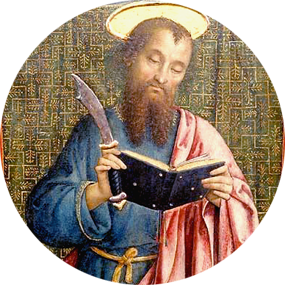
24 August
St. Bartholomew
Apostle
Born: 1st century AD, Iudaea Province (Palaestina)
Died: 1st century AD, Armenia
Major Shrine: Bartholomew-on-the-Tiber Church, Rome, the Canterbury Cathedral, cathedral in Frankfurt, and the San Bartolomeo Cathedral in Lipari
Patron of: Armenia; bookbinders; butchers; cobblers; Florentine cheese merchants; Florentine salt merchants; leather workers; nervous diseases; neurological diseases; plasterers; shoemakers; tanners; trappers; twitching; whiteners
St. Bartholomew, a doctor in the Jewish law, was a dear friend of St. Philip the Apostle. Because Bartholomew was a man “in whom there was no guile,” his mind was open to the truth. He went willingly with Philip to see Christ, and recognized the Savior immediately as the Son of God. After having received the gifts of the Holy Spirit on the first Pentecost, Bartholomew evangelized Asia Minor, northwestern India, and Greater Armenia. In the latter country, while preaching to idolaters, he was arrested and condemned to death.
COLLECT PRAYER
Strengthen in us, O Lord, the faith, by which the blessed Apostle Bartholomew clung wholeheartedly to your Son, and grant that through the help of his prayers your Church may become for all the nations the sacrament of salvation. Through our Lord Jesus Christ, your Son, who lives and reigns with you in the unity of the Holy Spirit, God, for ever and ever.

In St. John’s Gospel, Bartholomew is known by the name Nathaniel (the liturgy does not always seem aware of this identity). He hailed from Cana in Galilee, was one of the first disciples called by the Lord. On that initial meeting Jesus uttered the glorious compliment: “Behold, an Israelite indeed in whom there is no guile!” After the Resurrection he was favored by becoming one of the few apostles who witnessed the appearance of the risen Savior on the sea of Galilee (John 21:2). Following the Ascension he is said to have preached in Greater Armenia and to have been martyred there. While still alive, his skin was torn from his body. The Armenians honor him as the apostle of their nation. Concerning the fate of his relics, the Martyrology says: “His holy body was first taken to the island of Lipari (north of Sicily), then to Benevento, and finally to Rome on an island in the Tiber where it is honored by the faithful with pious devotion.”
The Church of Armenia has a national tradition that St. Jude Thaddeus and St. Bartholomew visited the Armenians early in the first century and introduced Christianity among the worshippers of the god Ahura Mazda. The new faith spread throughout the land, and in 302 A.D., St. Gregory the Illuminator baptized the king of Armenia, Dertad the Great, along with many of his followers. Since Dertad was probably the first ruler to embrace Christianity for his nation, the Armenians proudly claim they were the first Christian State.
Excerpted from The Church’s Year of Grace, Pius Parsch
Source: Catholic Culture